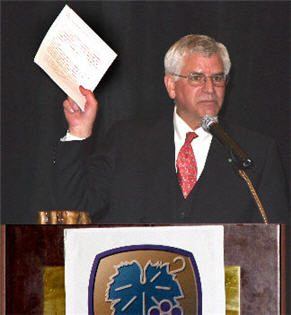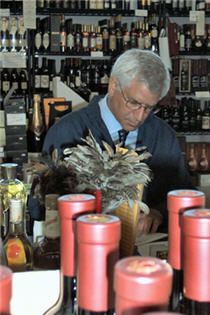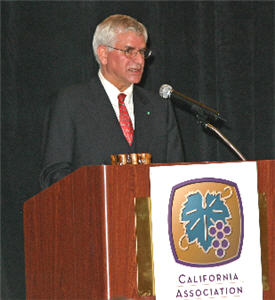

Darrell Corti is not exactly laying down the law, but he continues to passionately convey the problems he sees in California wines.
California (State Appellation)
Give 'em Hell, Darrell
Darrell Corti, the outspoken Sacramento wine merchant, speaks to an audience of California winegrape growers on some of the problems - and opportunities - of the California wine industry.
by
Alan Goldfarb
February 5, 2008
 n January 29, a standing-room-only crowd gathered in a spacious ballroom in a downtown Sacramento, Calif. hotel. The annual meeting of the California Association of Winegrape Growers was convening, but assuredly a preponderance of the audience was there to hear what Darrell Corti had to say.
n January 29, a standing-room-only crowd gathered in a spacious ballroom in a downtown Sacramento, Calif. hotel. The annual meeting of the California Association of Winegrape Growers was convening, but assuredly a preponderance of the audience was there to hear what Darrell Corti had to say.
Corti is the capital city wine merchant who has garnered a nationwide reputation for his outspoken and direct views about the domestic wine industry. Last March, he hurled a bag of overripe grapes, when he instructed his employees that Corti Brothers market was no longer going to sell wine whose alcohol percentages were more than 14.5. [See APPELLATION AMERICA’s story.]
The sack landed with a splat as Corti dug in his heels and railed at the California wine industry for making overwrought, unbalanced and high-alcoholic wines that he contended could not be consumed with food.
Thus, the industry folks - mostly grape growers -who gathered that late January evening, were expecting more of same from Corti. He didn’t disappoint in his 20-minute talk.
But this time, Corti’s remarks - a litany of ills that have beset the industry, with a heavy emphasis on the lack of research support for UC Davis (“California’s wine alma mater,” as he called it) - were fairly tempered.
He did take another pass at hurling invective at high-alcohol wines, especially Zinfandel. “As mutations sometimes do, the Zinfandel one just kept changing, getting bigger and bigger,” he declared. “Some fashionable wines have become undrinkable. They are almost spreadable. Twenty-six, twenty-seven degrees Brix or higher is the new twenty-four degrees Brix. Alcohol and extract have become the bywords, not drinkability.
“‘Certainly the wine has high alcohol, but the wine is in balance’ is now the winespeak. Humbug I say. I would like to see someone quaff a 15.5 percent or 16.2 percent Zinfandel. Yet these are persistently produced.”

We Sell No Hot Wine: Darrell Corti at his Sacramento wine store.
“It seems that the craft of winemaking, a craft raised to the level of art, has been compromised to the level of painting by numbers.”
Then this from the man who has been selling wine for 34 years: “Does California have a wine making tradition? We would like to think we do. Is it necessary that we do or don’t? … Perhaps our tradition has become modified to where there is recourse to methods, equipment, and perceived notions so that in California, we make whatever we want wherever. …
“What was traditional California wine? For those of us who are of a certain age, we know the names and the styles of wines. Do we make them now like they were traditionally? I don’t think so.
“In some respects this is better; in others it makes our wines more like every other wine. The so-called ‘international style’ began here, in California. Have we lost our way? What I find annoying in today’s wine business is that it generally does not have a sense of history. We look at the business just as numbers, boxes, turn-over and the like. … It lacks an appreciation for history …”
It also lacks appreciation, he believes for wine and winegrape studies at UC Davis. He pointed out that the U.S. lags behind in wine and grape research as compared to Australia (where $25 million was spent last year compared to only $2 million for American wine research).
He said that the oenology department at Davis “is being marginalized. It seems that we pay less and less attention to it when we should be paying more. … After all, if it were not for the University, a lot of you would not be here tonight. …Viticulture and enology programs need support and there seems to be little attempt to offer this support on the part of the industry.”
But all was not gloomy. When talking about the various grape varieties that are now being utilized, Corti said he thinks that’s a good thing. “I think the future holds interesting possibilities,” he said. “Unknown or unheard of varieties from almost unheard of places have become the norm in California …
“With our better understanding of grape growing, possibly Greek varieties like Assyrtiko, Moschofilero, Malagousia - white varieties adapted to very warm climates that retain high acidity - will become important for us in California. Red varietals from Italy, historically tried and found wanting in California, are now again being planted and produced to good effect: Aglianico, Teroldego, Marzemino, Nero d’Avola, Montelpulciano. … There are doubtless others.
 “California used to be experimental and innovative, world leading. Why? Not because we wanted to be, but because we could be. California had none of the constraints of the European model: certain varieties only in certain places. The free spirit style seems not to have disappeared in California wine growing and making.”
“California used to be experimental and innovative, world leading. Why? Not because we wanted to be, but because we could be. California had none of the constraints of the European model: certain varieties only in certain places. The free spirit style seems not to have disappeared in California wine growing and making.”
It’s been almost a year since Darrell Corti had the good sense and audacity to put the kibosh on high-alcohol wines in his Sacramento store. He shook up the industry.
Some have heeded his warnings, while others continue in their quest to satisfy a new kind of American consumer, who can’t seem to get enough - at any price - of the high-frequency stuff.
Corti says he has a pile of responses in his office to his line-in-the-soil stand. None of them negative. His wine sales have not been hurt, he insists. Just as UC Davis might command more respect, so too does Darrell Corti.
Photos by Ken Freeze










 READER FEEDBACK: To post your comments on this story,
READER FEEDBACK: To post your comments on this story,




